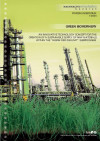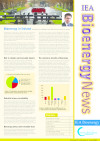Suchergebnisse
IEA-Task 42 Study: Bio-based chemicals

Value added products from biorefineries
Herausgeber: International Energy Agency, Task 42 (Bioraffinerie)
Englisch, 28 Seiten
Downloads zur Publikation
Implications of forestry carbon offsets for the coal industry (Kessels/Hennessy/Bakker, 02-2006)

Englisch
Innovative Refurbishment of Single Family Houses

Evaluation of best-practice models and recommendations to support dissemination
Green Biorefinery

1/2004
Herausgeber: BMVIT
Englisch, 6 Seiten
Downloads zur Publikation
S I P settlement models in passive house quality
Research, development and realization of integral building concepts in passive house quality!
Cascading BIOMATTERS for wellness and life-style
This application oriented and basic research aims to develop a pilot-master-project in the region of eastern Styria and Burgenland for the cascading use of regional cultivated plants and plant-residues in order to produce wellness and lifestyle-products - by which the creation of value is strongly realated to the functional qualities of the available biomatters.
Sorption cooling and air dehumidification device
Solar-assisted air-conditioning in combination with comfortable controlled ventilation systems soon possible and affordably for building owners. With a new part DEC-systems should become acceptance.
Conference: Global BioEconomy Summit 2015
25. - 26. November 2015
Berlin, DE
Food security, sustainable development, economic growth and the conservation of scarce natural resources - the promises of bioeconomy are manifold. The Global Bioeconomy Summit is the first community building platform to discuss bioeconomy policies globally. This summit builds on the post 2015 development goals to start a multilateral agenda setting process for a sustainable bioeconomy.
CLIMA 2016 - 12th REHVA World Congress
22. - 25. Mai 2016
Aalborg Kongres & Kultur CenterAalborg, DK
The scope of the congress is to offer researchers, industry, building owners, end users, consultants, engineers, architects, policy-makers, etc. a platform for the exchange of scientific knowledge and experiences on innovative technical solutions and on practical applications and technical solutions.
Conference: Smart Grids Europe 2010
29. - 31. March 2010
PTA - Passenger Terminal Amsterdam, Piet Heinkade 27
Amsterdam, NL
The 2nd annual Smart Grids Europe conference and exhibition will bring together 25+ of Europe´s industry professionals
ISES World Congress 2003 (Göteborg, S)
14 - 19 June 2003
Swedish Exhibition and Congress Center in Göteborg, Sweden
Congress about the newest developments of solar energy
Urban Future - "Resource Efficient City of Tomorrow"
Challenges fort he cities of tomorrow with research issues referring to resource management, efficiency and technology development
Virtual power plants for self-sustaining regions
Geographic methods for the combination of renewable energy sources to create "virtual power plants" and development of self-sustaining regions in terms of energy-balance and the Kyoto target.
IEA Bioenergy News, Vol. 27/#1/June 2015

Herausgeber: Paul Derham, odbtbioenergy
Englisch, 8 Seiten
Downloads zur Publikation
8th World Biofuels Market Congress
12. - 14. March 2013
Rotterdam, Netherlands
The largest and most successful Congress and Exhibition in the biofuels industry
AIDA – Affirmative Integrated Energy Design Action
The AIDA project aimed to increase the number of nearly-zero-energy-buildings, the number of building professionals trained on integrated energy design and the number of municipalities starting to build/refurbish buildings to nZEB levels.
Small wind turbines for households and companies
In a practical way the project showed that with optimised small wind turbines a useful potential of wind power can also be generated at different suitable locations with low wind conditions directly at households and companies.
Webinar: PVT Certification - lessons learnt when certifying PVT products
9. April 2019
online
The webinar gives an overview of the Photovoltaic/thermal Systems (PVT) certification.
Folder: Towards plus-energy neighborhoods

The newly published info folder provides an overview of technologies and subsystems for positive energy districts and provides explanations as to which strategic goals are being pursued with the "City of the Future" programme in the direction of plus-energy neighbourhoods.
Herausgeber: BMVIT
Englisch, 1 Seiten
Downloads zur Publikation
European legislation (revised LCPD and EU ETS) and coal (Nalbandian, 03-2007)

Englisch
